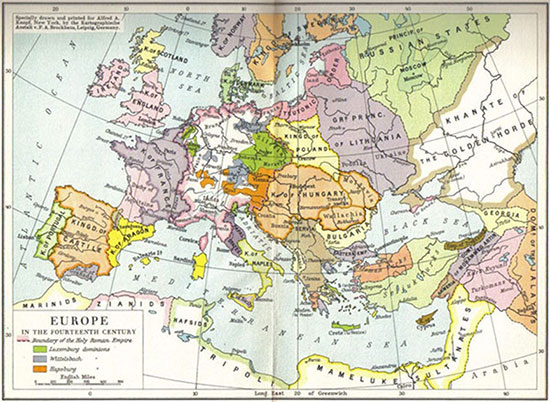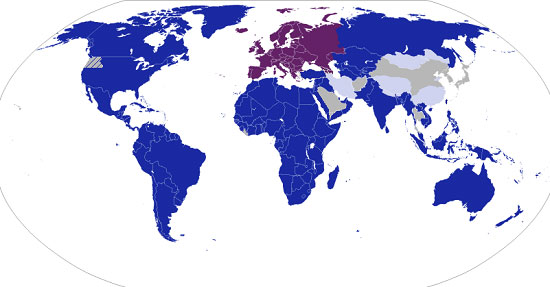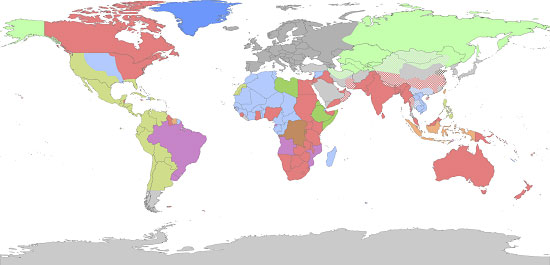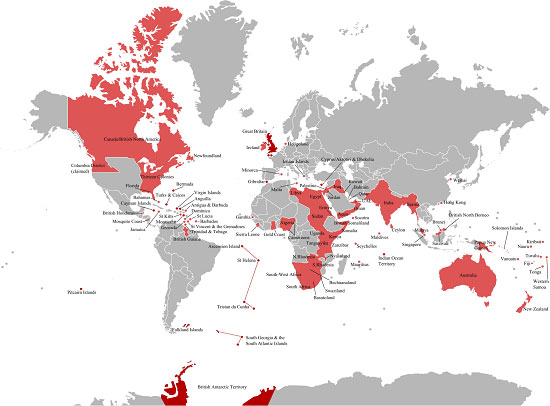European Colonialism: A Different Perspective
Andrew Hamilton

Click to enlarge.
Jettison political correctness and pre-1945 European colonialism can be viewed as an expression of demographic growth, dominance, racial health, and vitality. Nobody centrally planned or thought it through beforehand, or while it was happening. It transpired over centuries, encompassing many generations of people who lived and died—well beyond the collective time horizon of whites for deliberate planning purposes. In retrospect, and from a broad perspective, it represented the instinctual behavior of a people.
By the same token, the ignominious, virtually instantaneous collapse of colonialism following WWII coincided with loss of racial confidence, vitality, and self-governance. By then, whites no longer controlled their own destiny. As with the opening of the immigration floodgates, the hasty retreat from empire preceded white population collapse, which did not begin until after 1965.
In addition to racial dominance, population size must be taken into account whenever migration and the exercise of political power are concerned. This is as true of Jews as it is of everybody else, despite the unique ecological niche they occupy. There is no objective evidence, no replicable procedure to verify that Jews constitute as small a population as is claimed. It is true that they operate secretly, with a degree of conscious, coordinated, conspiratorial behavior unmatched by any other race—indeed, it is vastly underestimated by everyone, and a cornerstone of their supremacy. But the more miniscule you accept their population to be, the more intrigue you must allow in order to account for their inordinate power. In politics, demographics applies to everyone—unless, of course, you believe (as many atheists and anti-Christians do) that Jews are divine.
Though the Portuguese began systematically exploring the Atlantic coast of Africa as early as 1419 under the patronage of Prince Henry the Navigator, the third son of John I, King of Portugal, and explorer Bartolomeu Dias rounded the Cape of Good Hope (the southern tip of Africa) in 1488, Columbus's first voyage to the New World in 1492 on behalf of Spain is often taken as the cutoff point to mark the beginning of the modern age of discovery, exploration, and European colonization.
At the outset of the period, in 1483, the three largest population groups in the world were East Asians with 138 million people (China 120 million, Japan 15 million, and Korea 3 million), Asian Indians with 110 million, and white Europeans with 73 million. Between Europe and India the Near East held 25 million people, 2.5 million of whom were nomadic herdsmen. (These and subsequent 1483 population figures are from Colin McEvedy, The Penguin Atlas of Modern History (to 1815), 1972, pp.8-9)
These people were virtually all farmers, not hunter gatherers or city dwellers. Prior to the 1800s, industry and towns had only marginal demographic significance. Populations elsewhere were smaller. Northern Africa (the populated southern shore of the Mediterranean north of the Sahara Desert) contained 8 million people, and sub-Saharan (black) Africa 25-35 million. The Western Hemisphere counted 11 million Amerindian inhabitants: 5 million in Mexico and Central America, 5 million in South America, and a million hunter gatherers in North America.
Over the next 500 years, the white race grew at a rapid pace, enabling large-scale emigraion from Europe and above replacement fertility at home and abroad simultaneously. Colonization was a sign of demographic strength.


Map key: Click here
On this map, which shows ten European empires at their maximum extent, the large territorial expansion of Russians into Siberia can clearly be seen. The history of the expansion is little known to whites.
From 1500-1800, after the power of the Mongols and Turks had been broken, intermittent movements eastward by Euro-pean Russians swelled to a steady flow.
By 1697 Siberia had 150,000 Russians and 125,000 natives. Settlements were founded on the Pacific coast by 1763, and the first Russian colony in North America was established in 1784 on Kodiak Island off the southern coast of Alaska. Russian fur traders, who plied their trade as far south as Canada and California, built Fort Ross near San Francisco Bay in 1812. Still, the penetration of North America did not involve large numbers of people. When the US bought Alaska from Russia in 1867, only 400 Russians resided permanently in the entire territory, and the maximum number ever was 700.
In Siberia it was different. By 1965 the population had reached 30 million, or 15 percent of the USSR's total. (No telling how many were political prisoners in concentration camps!) Non-white natives were as scarce as Amerindians and Eskimos in the US and Canada. (Carleton Coon, The Living Races of Man, 1965, p. 300)
Despite the loss of large territories such as those belonging to Spain and Portugal in Latin America (where European race-mixing was completely out of control), the late 19th and early 20th centuries, as one mainstream writer expressed it, "witnessed an unprecedented extension of European power over non-Europeans."

The largest empire of all was Great Britain's. In the last quarter of the 19th century it attained a position more nearly approaching world mastery than perhaps has ever been achieved by any other power in history. It was not merely that Britain had amassed what was historically the largest empire ever known. Britain maintained its long lead over competitors in industrial innovation and production until almost the end of the century. (Rand McNally Atlas of World History, 1981, p. 124)
In the 19th century Britain had more foreign trade than any two other countries combined, produced one-third of the world’s industrial output and more coal than all other countries, led in the production of iron, was the world’s largest foreign investor, dominated the globe’s transportation and communications systems, supplied the capital and technology to construct railways on five continents, and owned most of the world’s undersea cables. The pound sterling formed the basis of the international payments system. The British merchant fleet had more tonnage than all other countries put together, and the Royal Navy was the most powerful seaborne force in the world.
A glance at the map suggests what a staggering task it must have been to efficiently administer such a far-flung global empire during the period in question. It would seem that a fair amount of delegation of power and autonomy on behalf of the governors must have been allowed.
Europe’s globe-girdling colonial empire has been briefly outlined here from a non-apologetic perspective. I have eschewed contemporary ideological judgments and ultra-fine moral distinctions that our enemies one-sidedly ignore for themselves anyway, and looked at matters from a strictly natural history, biological-historical rather than moral-philosophical standpoint. But the amazing story of Europeans’ exploration and conquest of the planet contains a forward-looking lesson as well. Europe, the United States, Canada, Australia, New Zealand, South Africa, South West Africa (Namibia), Rhodesia (Zimbabwe), and Siberia (Russia-in-Asia) should all be fully reclaimed by, and reserved exclusively for, whites as part of a Greater Europe or White Imperium, with the exception of set-asides for native inhabitants such as Amerindians in North America and Aborigines in Australia.
This is not as far-fetched as it sounds. Anti-white, Left-wing elements already entertain comparably ambitious dreams. There is no reason why whites should not develop similar plans of their own.
The strategic location of these neo-Europes in every corner of the globe, blessed with moderate climates and rich stores of natural resources, colonized by whites in the modern era and still ours until recently, provide the solid foundation for a major, well-populated, worldwide race-based federation or confederation capable of securing the existence of our people and a future for white children on this planet for centuries to come.
Comments
P. Posted April 26, 2014
The British Empire was the Rothschild Empire , the mining magnate Cecil Rhodes who believed the Anglo-Saxon race to be the best in the world was just a puppet in the hands of the Jewish London bankers. The only White nation that fought the Jewish two- headed Beast of Capitalism and Communism was Germany. The Anglopshere dominance represents the Death of the White Race.
Andrew Hamilton Posted April 26, 2014
This is a simplistic and inaccurate way to look at it but does raise a point. Jews have such a distorting effect on white culture, and have always been so inordinately powerful within it, that the question of their role in European imperialism naturally arises.
I have described elsewhere an incredible, though unknown, episode from the American Revolution about the demands of a Jewish banker in the Netherlands in return for supplying financing to the revolutionaries against Great Britain. John Adams irresponsibly opened that can or worms, and Benjamin Franklin firmly stopped it from going forward—entirely conscious of the fact that he was dealing with a Jew. http://www.counter-currents.com/2012/07/benjamin-franklin-and-the-jews/
Jews likewise played a huge role in the British Empire. The Rothschilds are one example. The Sassoon and Kadoorie (India, Hong Kong, Shanghai) families in Asia are two more. The Sassoons, "the Rothschilds of Asia," were largely responsible for the "British" opium trade (and addiction) in the Far East. Jewish influence was enormous in South Africa and Rhodesia from the beginning of the British period. And, of course, there was no greater "British" imperialist than the 19th century racist Chancellor of the Exchequer (the equivalent of our Treasury Secretary) and Prime Minister of Great Britain (Prime Minister, for Christ's Sake!) Benjamin Disraeli, a Sephardic Jew. Even Columbus’s first voyage was financed largely or in part by Sephardic and Marrano Jewish bankers.
So, a thorough analysis of colonialism would require close study of this issue. The roles of the two races would have to be meticulously disentangled. Possibly, as turned out to be the case with Negro slavery and the plantation system, the Jewish role in colonialism was much greater than the conventional narrative indicates.
FR Posted April 26, 2014I have no moral objection to the historical settlement of Europeans in areas sparsely populated by primitive hunting-gathering tribes, such as in North America, the area East of the Andes in South America, Siberia and Australia, provided those primitive peoples were resettled in as humane a manner as possible. Colonization of areas already densely populated by other races proved to be of no advantage for Europeans and perhaps for the local peoples as well. We can brag that we "brought civilization" to those areas, but, for example, a country like Thailand never was a European colony and is more developed than Burma which was a colony. Most other ex-colonies became more developed after decolonization, for example India and Indonesia.
Europeans made some blunders in their colonizations. In Latin America they miscegenated with the local population on a grand scale, creating a majority Mestizo population, and they imported millions of African slaves into the New World, creating a demographic problem insoluble to the present day. In South Africa and Rhodesia their beneficent rule caused the local black population to grow exponentially, endangering that very rule. European world colonization was too unsystematic and too much inspired by greed, short sightedness and sometimes naivete to be ultimately beneficial. Unfortunately we cannot redo it better.
Andrew Hamilton Posted April 26, 2014It was perceptive of you to pick up on the main difference between southern Africa and the others I mentioned. I was conscious of this fact. However, my aim would be to expel the blacks northward. They were not present in southern Africa until about 500 AD. Bushmen were the native inhabitants (hunter gatherers, so not a dense population), but they were supplanted by the southern migration of blacks (Bantus).
I closely followed the deliberate destruction of South Africa while it happened because by that time I understood the underlying racial dynamics. It is unforgivable, as is the treatment of the white inhabitants since. The southern African countries were First World nations—South Africa even possessed nuclear weapons. My heart is hard on that score. I'd take it back—all back. The blacks can move northward. My idea is not to "repeat India" there. Whites would not rule over a large black population as before.
In terms of race-mixing and other mistakes, the point is to learn from the past and not repeat it. As I stated in the article, European colonialism represented the instinctual behavior of a people over a 500-year time span. One shouldn't think of it as a planned, thought-out sort of thing, because that's not what it was.
A. Posted April 26, 2014
Where I live in Western Europe, non-Whites are less than 5% of the population and are all recent arrivals, but we are supposed to believe we can never expel them, because it would be too traumatic. And we cannot prevent them from becoming the majority in a few decades, because we cannot go against the march of history, and the capitalists need more and more illiterate, low IQ third-worlders. So, we are told we can never undo what has not even been done yet. In actual fact, no technical or moral obstacles prevent us from expelling the invaders. The only obstacle is political. What is unfolding today in Western countries is much more traumatic to us than it would be for the non-whites to be expelled. If Europe and the USA only had a few thousand non-whites here and there, it would be possible to ignore the subject. We would prevent new immigration but we would make an exception for the few non-Whites who are already living among us. But there are now so many of them that the only choice is between our destruction and their expulsion. Once we start expelling them, there is no longer any reason to make exceptions.

